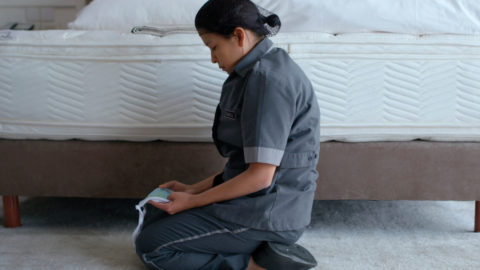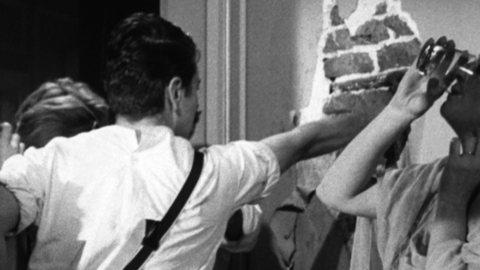Film of the Week: Workforce
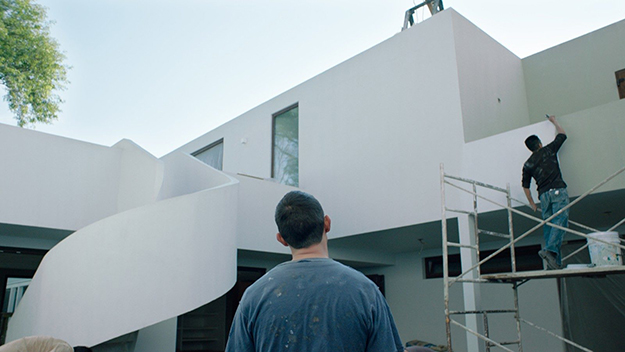
Workforce (David Zonana, 2020)
It may be pure coincidence that David Zonana’s drama Workforce happens to resemble the one foreign-language film that the entire world is talking about right now: some canny distributor somewhere is bound to try pitching the film as the Mexican Parasite. But then themes of privilege, territory, and revenge are bound to be to the fore in the world’s current economic and political climate, and Zonana happens to have found a way to dramatize them in a way that’s superficially not dissimilar to Bong Joon Ho, if only in terms of starting point. That said, Workforce—which screened earlier this week in Film at Lincoln Center’s Neighboring Scenes program—has entirely different concerns and methods beyond the initial premise of home invasion. It’s a taut, concise (at 82 minutes), bracingly uneasy film, all the more involving because it starts off promising a realistic drama of the working life, almost in a Loachian vein, then becomes something else entirely, something closer to an absurdist political parable.
The film is set largely in and around a house in construction: a luxury palace of a whitewashed modernist villa, which a large contingent of builders and decorators are getting ready for its eventual inhabitant: a wealthy single man who, when he moves in, will have the whole place to himself. The first shot shows work carrying on in the house’s courtyard, and then suddenly something terrible happening, shown in a matter-of-fact way that makes it all the more startling. Cut to a family funeral for the man who has just died in this utterly mundane fashion: the fact of his death, as if taken for granted by all around him (who ever expected safety standards?), is suggested by the way that his coffin sits, just visible, at the edge of the frame, almost an incidental detail in the shot.
The dead man’s name is Claudio, and the central figure of Workforce is his brother Francisco (Luís Alberti). Francisco is the type who takes charge of situations, and one thing he determines to do is to get justice for Claudio’s pregnant widow Lupe (Jessica Galvez). She has been told by authorities that Claudio was drunk on the job—manifestly a lie to avoid paying compensation, as her husband was not a drinker. Francisco takes Lupe to see a woman behind a desk to look into the case, but the official channels clearly won’t be much use, any more than the worksite’s ineffectual foreman, who won’t do anything to question the status quo. As for the owner of the house, he’s a bored business type who barely looks at Francisco when he tries to confront him, referring him to his people—who clearly won’t be any help either. The refrain of the film is that no one is ever available to answer complaints. But by the time someone else, at the end of the film, says, “There’s no one to talk to,” this familiar line has acquired a sharp ironic twist, for the terms of the game have now changed—and yet, in one crucial way, stayed the same.
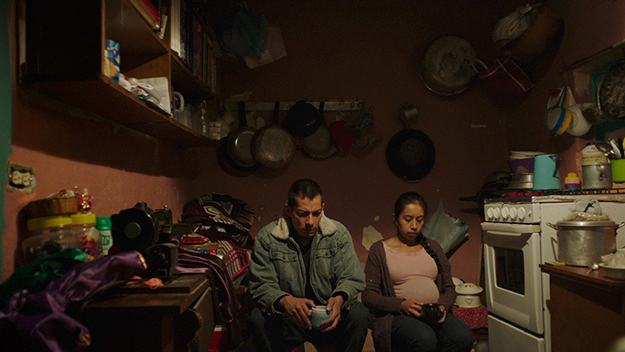
Before long, Francisco is attending another funeral, and getting angry about the way things are done. He is also rained out of his own home, a shanty with a leaky roof of corrugated plastic. So he decides to camp in the luxury house overnight, and ends up becoming a secret fixture there, reclining at night in the marble bathroom. Another worker, Shorty (Jonathan Sanchez), ends up joining him; like Francisco, he too has clambered over the wall, although his aim is to get revenge on the boss who has stiffed him on his wages.
Before long, as it turns out, the place becomes available for occupation—and exactly how that happens is easily guessable, although it’s left ambivalent by one of the sly elisions that editor Oscar Figueroa places so artfully throughout. Making himself thoroughly at home—and selling off the owner’s roomful of new furniture, still in its plastic wraps—Francisco invites his workmates and their families to join him in this residential utopia, occupying the bourgeois territory they have always been excluded from. In theory, the community is protected legally; at least, Francisco insists that they are, and retains a lawyer to ensure that they’ll be safe, although this noncommittal character, who turns up for occasional meetings trailing his lank ponytail, isn’t altogether the sort to inspire confidence.
Not unpredictably, the founder of this little makeshift republic keeps a certain privilege for himself. Francisco lounges royally in the rooftop jacuzzi and keeps the largest room upstairs for himself, while things get crowded down below. In a scene that substantially erodes his leader-of-the-people status, he’s shown to be exercising, or at least attempting to, a sort of droit de seigneur. First he adjudicates an argument between two young women about whose turn it is to hang out their washing in the courtyard; then he asks one to follow him upstairs, and plies her with decidedly uncomfortable attentions. The scene tellingly cuts off.
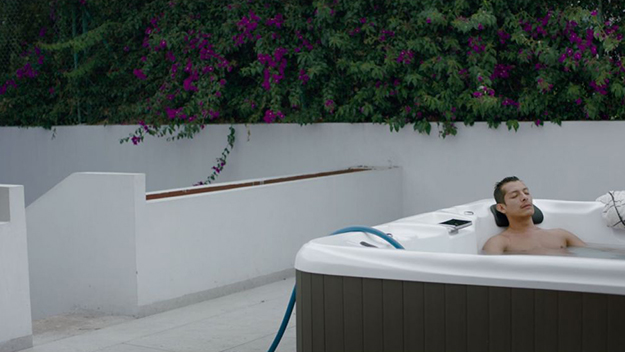
It’s an elegant touch on Zonana’s part that, even if it is fairly clear how things ultimately turn out as they do, nothing is spelled out. Alberti makes a nicely elusive central figure—saturnine, taciturn, with a strong internalized energy that makes Francisco believable as the committed social mover he seems at first, but also as the darker figure he becomes. Writer/director Zonana, previously known as the producer of Michel Franco—who himself does production duty here—handles it all with a wry economy. The shots are elegantly blocked and composed, with DP Carolina Costa barely moving the camera except for a handful of telling key moments.
Tersely satirical, Workforce comes across as a rather despairing political parable, and might be read as a familiar conservative vision, denying the possibility of real social change. It does, however, seem very levelheaded, very unromantic, democratic in its use of a large ensemble cast around Francisco, and also even-handed in its depiction of Mexican working-class life. Its sparseness and dry wit, and the way it takes everyday working realities and spins them into something more uncannily resonant, makes it a close relation to another recent Mexican film, The Chambermaid, the eloquent, ingenious depiction of female drudgery and the capitalist dream world made two years ago by Lila Aviles. One last comparison with Parasite: as with that film, you can barely resist saying that the house (the production design is by Ivonne Fuentes) is the real star.
Jonathan Romney is a contributing editor to Film Comment and writes the Film of the Week column. He is a member of the London Film Critics Circle.



